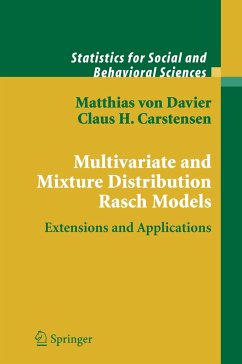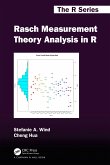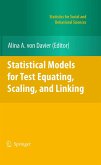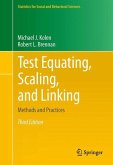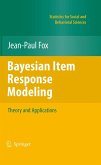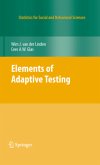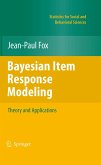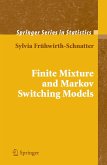This volume covers extensions of the Rasch model, one of the most researched and applied models in educational research and social science. This collection contains 22 chapters by some of the most recognized international experts in the field. They cover topics ranging from general model extensions to applications in fields as diverse as cognition, personality, organizational and sports psychology, and health sciences and education.
The Rasch model is designed for categorical data, often collected as examinees' responses to multiple tasks such as cognitive items from psychological tests or from educational assessments. The Rasch model's elegant mathematical form is suitable for extensions that allow for greater flexibility in handling complex samples of examinees and collections of tasks from different domains. In these extensions, the Rasch model is enhanced by additional structural elements that either account for differences between diverse populations or for differences among observed variables.
Research on extending well-known statistical tools like regression, mixture distribution, and hierarchical linear models has led to the adoption of Rasch model features to handle categorical observed variables. We maintain both perspectives in the volume and show how these merged models-Rasch models with a more complex item or population structure-are derived either from the Rasch model or from a structural model, how they are estimated, and where they are applied.
This volume gathers together a set of extensions of the Rasch model, one of the most prominent models for measurement in educational research and - cial science developed by Danish mathematician Georg Rasch. The idea for this volume emerged during a meeting of the Psychometric Society in M- terey, CA. At that meeting, friends and colleagues discussed news about the impending retirement of Dr. Jurgen ¨ Rost, an important innovator and m- tor in this ?eld. To recognize Jurgen's ¨ contributions, we decided to produce a collection of research on extending the Rasch model as well as embedding the Rasch model in more complex statistical models, an area that is receiving broad interest in many ?elds of social sciences at the current time. This collection contains 22 chapters by recognized international experts in the?eld.Thecontributionscovertopicsrangingfromgeneralmodelextensions to application in ?elds as diverse as cognition, personality, organizational and sports psychology, and health sciences and education. The Rasch model is designed for categorical data, often collected as ex- inees' responses to multiple tasks such as cognitive items from psychological tests or from educational assessments. The Rasch model's elegant mathema- cal form is suitable for extensions that allow for greater ?exibility in handling complex samples of examinees and collections of tasks from di?erent domains. In these extensions, the Rasch model is enhanced by additional structural - ements that account either for di?erences between diverse populations or for di?erences among observed variables.
The Rasch model is designed for categorical data, often collected as examinees' responses to multiple tasks such as cognitive items from psychological tests or from educational assessments. The Rasch model's elegant mathematical form is suitable for extensions that allow for greater flexibility in handling complex samples of examinees and collections of tasks from different domains. In these extensions, the Rasch model is enhanced by additional structural elements that either account for differences between diverse populations or for differences among observed variables.
Research on extending well-known statistical tools like regression, mixture distribution, and hierarchical linear models has led to the adoption of Rasch model features to handle categorical observed variables. We maintain both perspectives in the volume and show how these merged models-Rasch models with a more complex item or population structure-are derived either from the Rasch model or from a structural model, how they are estimated, and where they are applied.
This volume gathers together a set of extensions of the Rasch model, one of the most prominent models for measurement in educational research and - cial science developed by Danish mathematician Georg Rasch. The idea for this volume emerged during a meeting of the Psychometric Society in M- terey, CA. At that meeting, friends and colleagues discussed news about the impending retirement of Dr. Jurgen ¨ Rost, an important innovator and m- tor in this ?eld. To recognize Jurgen's ¨ contributions, we decided to produce a collection of research on extending the Rasch model as well as embedding the Rasch model in more complex statistical models, an area that is receiving broad interest in many ?elds of social sciences at the current time. This collection contains 22 chapters by recognized international experts in the?eld.Thecontributionscovertopicsrangingfromgeneralmodelextensions to application in ?elds as diverse as cognition, personality, organizational and sports psychology, and health sciences and education. The Rasch model is designed for categorical data, often collected as ex- inees' responses to multiple tasks such as cognitive items from psychological tests or from educational assessments. The Rasch model's elegant mathema- cal form is suitable for extensions that allow for greater ?exibility in handling complex samples of examinees and collections of tasks from di?erent domains. In these extensions, the Rasch model is enhanced by additional structural - ements that account either for di?erences between diverse populations or for di?erences among observed variables.
From the reviews: "This is a collection of 22 chapters on research and development work on various extensions of the Rasch model. ... The single chapters are written by internationally recognized experts in the fields. ... Since the volume reflects the recent developments in the field it will be certainly a useful source up to date information. It will be certainly useful to the people working in educational research and social sciences." (Marie HuSkova, Zentralblatt MATH, Vol. 1117 (19), 2007) "This book, published in honor of the retirement of Jürgen Rost, is an edited volume of 22 invited chapters written by eminent researchers in the field of item response theory (IRT). The chapters are relatively accessible for a reader with a background in IRT and describe interesting and useful extensions to the familiar unidimensional Rasch measurement model (RM) to more complex multidimensional measurement and statistical models." (Allan S. Cohen, Journal of the American Statistical Association, Vol. 103 (481), 2008)

